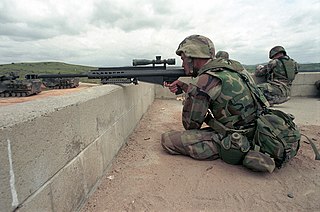
by Guest Author Ross Caputi
As shown in the first three segments of my review of American Sniper, there are many well-documented facts, crucial to understanding the American presence in Iraq, but none of them come through in American Sniper. Instead, the plot is guided by Chris Kyle’s autobiography, in which his narration of his life story describes the Iraq war and occupation through the lens of a number of common, but false, beliefs—like, for example, that the people we were fighting against were evil because Islam taught them to kill Americans.
One scene shows Chris in a moral dilemma. He is on a rooftop with his sniper rifle, and through the scope he sees a woman walking with a young child next to her (presumably her son) as she carries a grenade toward a US patrol. Chris must either kill a mother and her child or leave his countrymen exposed to an attack.
In his autobiography, Chris says that this event happened in Nasiriya during the initial invasion. However, Clint Eastwood decided to situate this scene during the 2nd siege of Fallujah in 2004. Also, in the film the woman hands the grenade to her son and encourages him to rush at the US patrol, whereas in the book it is the woman who tries to throw the grenade. Did Clint Eastwood think that the woman’s involvement of her little son is a more representative portrayal of the Iraqi resistance? It’s not. These human-shield tactics were extremely rare and were only used by the most marginal and unpopular militias.
In the film, Chris kills both the woman and her son. Although visibly conflicted about what he felt obligated to do, he comments that, “that was evil like I ain’t never seen before.”
There is another moral dilemma in this scene that may not be obvious to American viewers: That woman had every right to attack the illegal, foreign invaders in her country, whether you agree with her tactics or not. We had no right to invade a sovereign nation, occupy it against the will of the majority of its citizens, and patrol their streets.
Author’s bio: Ross Caputi is a former Marine who participated in the 2nd Siege of Fallujah. Today he is on the Board of Directors of the Islah Reparations Project. He is also the Director of the documentary film Fear Not the Path of Truth: a veteran’s journey after Fallujah Ross holds an MA in Linguistics and he is working on an MA in English Studies at Fitchburg State University. Read his blog here.

